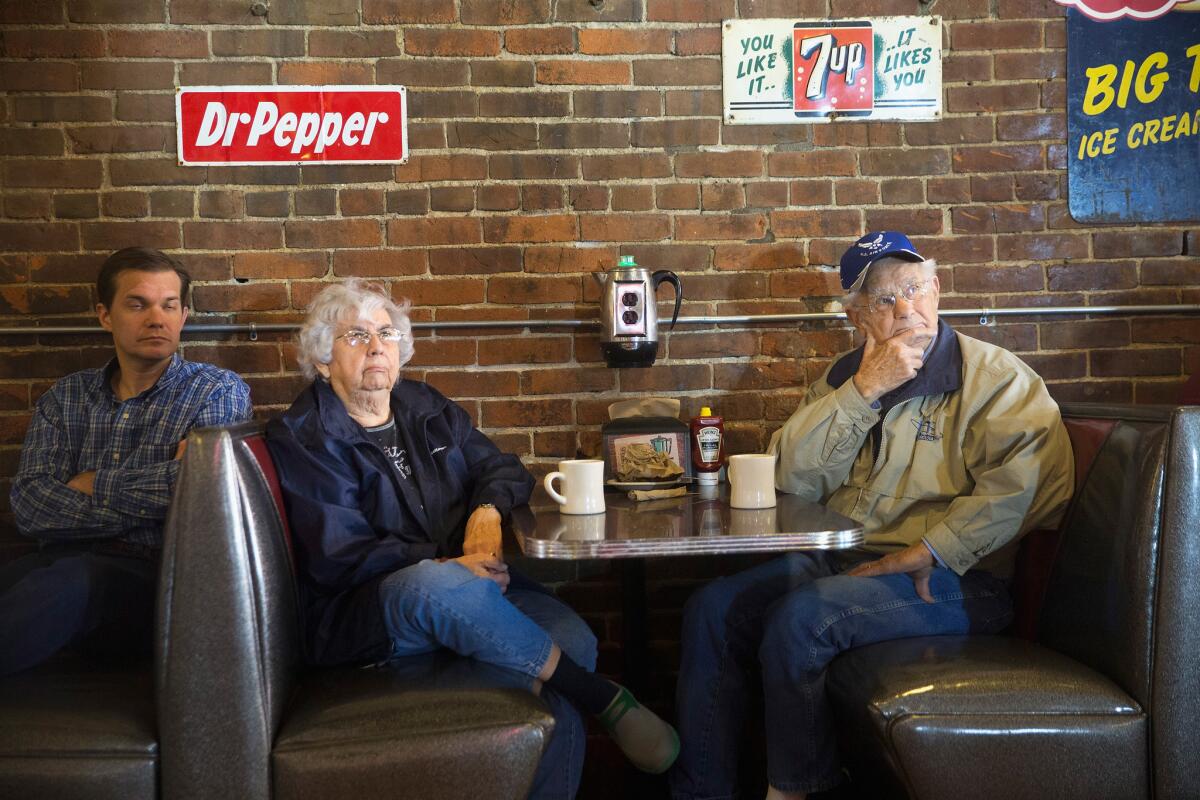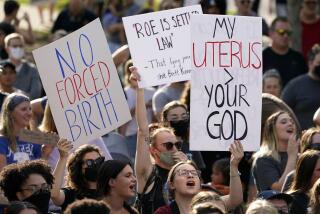Why Iowa clings to the top of the campaign calendar, despite a spotty record of picking candidates

People listen as Republican presidential candidate Marco Rubio speaks during a campaign stop in Oskaloosa, Iowa.
- Share via
Reporting from Des Moines — Ted Cruz discussed the pain of his parents’ divorce. Ben Carson recalled losing a young patient in surgery. Mike Huckabee described the anguish of administering the death penalty.
“If that doesn’t sober you up to reality,” the former Arkansas governor said to pin-drop silence from a crowd of hundreds of Christian conservatives, “nothing will.”
It’s hard to imagine such a raw, confessional conversation taking place almost anywhere but Iowa, where every four years White House hopefuls descend to bare their ambitions, present their visions and reveal a bit of their souls in pursuit of the nation’s highest office.
They come and endure the relentless scrutiny, even though Iowans have — at best — a middling record when it comes to picking presidents, especially on the Republican side.
TRAIL GUIDE: All the latest news on the 2016 presidential campaign >>
Since 1980, when Iowa held its first seriously competitive GOP caucuses, the first-place finisher has gone on to win the party’s nomination less than half the time. Only once, in 2000, have Republicans sent forth a winner to the White House — George W. Bush.
Even so, Iowa has been swarmed by Republican hopefuls this election season and has already hosted hundreds of campaign events, including Friday night’s “family forum” in snow-plastered Des Moines, where seven candidates fielded more than two hours of questions, including, “Where was God on 9/11?”
“On the throne in Heaven,” replied Sen. Marco Rubio of Florida. “And the reality of it is … that God’s ways are not our ways.”
There are many reasons the candidates keep coming, including habit and the ease of campaigning in a friendly, readily navigable and relatively inexpensive state.
But the most important is this: Iowa will cast the first votes of the 2016 campaign, on Feb. 1, and whoever wins here will get a significant boost going forward.
For the rest of the field, a poor showing could effectively end their campaigns.
“Iowa is not a place that picks presidents,” said Drake University’s Dennis Goldford, who has co-written a book on the history of the Iowa caucuses. “But very often it decides who’s not going to be.”
That entails a certain creative logic.
One big incentive to compete in Iowa, despite the mixed success of past winners, is the fact that a candidate doesn’t need to prevail in the traditional sense, as in getting the most votes, to do well and reap considerable benefits. Simply beating expectations, regardless of where a candidate places, can be enough to claim victory and get a jolt of momentum heading into the contests that follow, starting eight days later with the New Hampshire primary.
“That’s really all a candidate can ask, is an early state giving them a chance to move on,” said Henry Barbour, a Republican strategist and coauthor of a 2013 report on the GOP nominating process, which recommended preserving Iowa’s special place on the election calendar.
With just about two months remaining, the Republican contest is shaping up as a competition among candidates in three distinct categories.
There are the political newcomers — retired neurosurgeon Carson, billionaire Donald Trump and businesswoman Carly Fiorina — who are competing for the outsider mantle.
There are the practiced politicians vying for establishment support, chiefly Rubio, former Florida Gov. Jeb Bush and New Jersey Gov. Chris Christie. (Sen. Rand Paul of Kentucky is too unorthodox for the taste of many party regulars.)
And there are the social conservatives — Huckabee, Sen. Cruz of Texas and former Sen. Rick Santorum of Pennsylvania — who are vying for the support of evangelical Christians.
------------
For the Record
Nov. 29, 6:08 p.m.: An earlier version of this article referred to Sen. Ted Cruz of Kentucky. Cruz is from Texas.
------------
Notably absent from Friday’s religiously themed forum were Trump, Christie, Bush and Ohio Gov. John Kasich, who is concentrating his efforts in New Hampshire.
Paradoxically, the size of the Republican field — the biggest ever in Iowa — gives candidates more reason to compete, as even a small percentage of the vote on caucus night could yield significant reward. Simply finishing first in one of those three brackets would probably be enough for a candidate to claim a measure of victory and emerge as the front-runner among like-minded Republicans across the country.
“You may not win Iowa,” said David Yepsen, who covered all or part of nine caucuses for the Des Moines Register and now teaches journalism at Southern Illinois University. “You just don’t want to be winnowed out.”
Christian conservatives have long been a powerful force in Iowa, especially in recent caucuses when they boosted Huckabee and Santorum to victories in Iowa in 2008 and 2012, respectively. Both, however, finished well short of the GOP nomination.
That has led many here, mainly in the Republican establishment, to express fears that Iowa could lose its coveted lead-voting status by backing yet another candidate who wins the caucuses but little else. (There is already concern the play for support in national polls, used to decide who makes the presidential debate stage, has eroded Iowa’s authority.)
The candidates most often mentioned are Trump and Carson, though some also worry that the pugnacious Cruz, with his undiluted conservatism, may lack the broad appeal needed to win in November 2016.
“If you’re the opening state, you want to give momentum to someone who can get elected,” said Doug Gross, a Des Moines attorney who was the GOP nominee for governor in 2002. “If you keep giving it to someone who can’t win, then you’re not serving the purpose.”
There are plenty, of course, who would argue that standing on principle is more important than winning elections, and some, like Cruz, who argue it is possible to do both.
But the discussion remains academic for now.
For more than 40 years, candidates have come to Iowa, braving winter storms and hecklers at the summer fair, because they know that reporters camped in the state will cover their events. Reporters, in turn, go to Iowa because they know that is where they can find the White House candidates.
It’s been a mutually beneficial, self-perpetuating loop that will likely persist.
“As long as the press thinks Iowa is important, so will the candidates,” said Goldford, the caucus historian. “And as long as the candidates think Iowa is important, so will the press.”
Twitter: @markzbarabak
ALSO
L.A. art collector vows to cut off funds to Democrats who voted for Syrian refugee bill
Rubio faces pressure from all sides over his views on immigration
Voters distrust government in general, but like many specifics, poll finds
More to Read
Get the L.A. Times Politics newsletter
Deeply reported insights into legislation, politics and policy from Sacramento, Washington and beyond. In your inbox twice per week.
You may occasionally receive promotional content from the Los Angeles Times.











